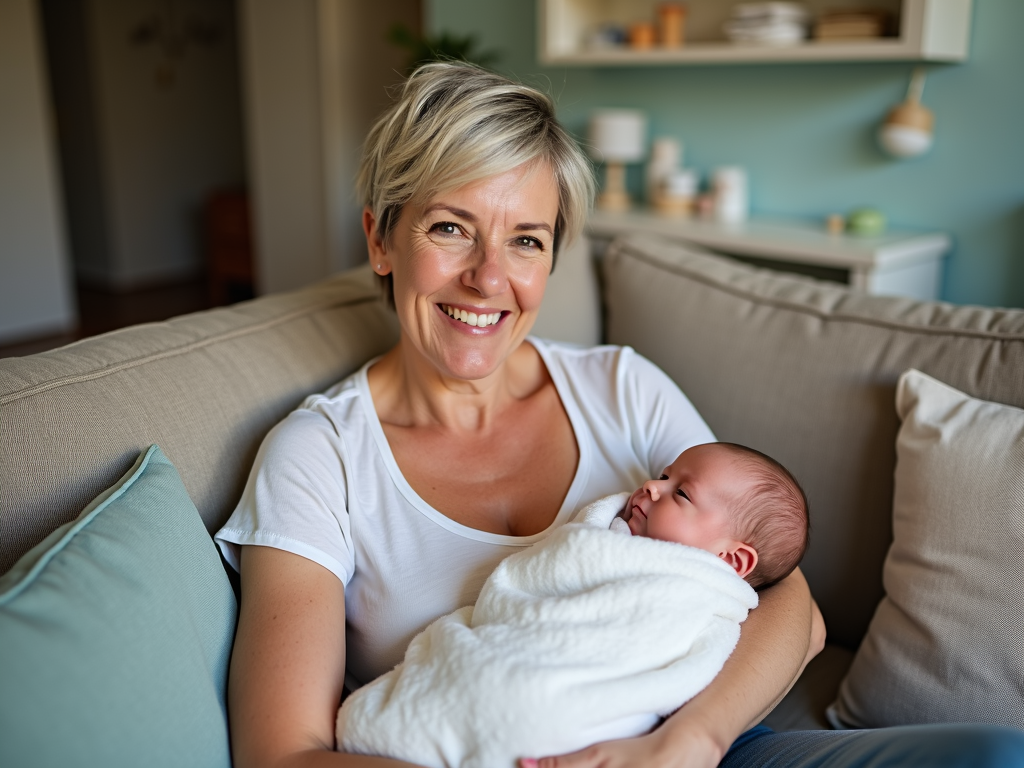IVF Success Stories After Cancer Treatment: Hope and Possibility
April 23, 2025, 7:27 a.m.
Cancer is a word that strikes fear into the hearts of many, but for those who dream of starting a family, it can feel like a double blow. The treatments that save lives—chemotherapy, radiation, surgery—can also damage fertility, making it difficult or impossible to have biological children later on. However, thanks to advances in reproductive medicine, there is hope. Fertility preservation techniques, such as freezing eggs, sperm, or embryos before treatment, offer a chance to build a family after recovery. And for many, In Vitro Fertilization (IVF) becomes the key to unlocking that dream.
In this article, we'll share real-life stories of cancer survivors who have successfully used IVF to become parents. We'll also explore the benefits of fertility preservation for cancer patients and how IVF works in these cases. Whether you're a cancer patient, a survivor, or someone supporting a loved one through this journey, these stories and insights can provide hope and guidance.
What is Fertility Preservation?
Fertility preservation is a proactive measure taken by individuals who are about to undergo medical treatments that could impair their ability to have children. For cancer patients, this often means freezing eggs, sperm, or embryos before starting chemotherapy or radiation. These treatments, while life-saving, can damage reproductive cells, leading to infertility.
- For women: Options include egg freezing (cryopreservation of unfertilized eggs), embryo freezing (if they have a partner or use donor sperm), or ovarian tissue freezing.
- For men: Sperm freezing is the most common method.
By preserving fertility before treatment, patients can increase their chances of having biological children in the future. According to the American Society of Clinical Oncology, discussing fertility preservation with a doctor should be a standard part of cancer care for patients of reproductive age.
Why Fertility Preservation Matters
When facing a cancer diagnosis, the focus is understandably on survival. However, for many, the ability to have children is a significant part of their future plans. Fertility preservation offers several benefits:
- Hope for the future: Knowing that there's a plan in place for starting a family can provide emotional strength during treatment.
- Options after recovery: Even if a patient isn't sure about having children, preserving fertility keeps the door open for possibilities.
- Peace of mind: It can alleviate some of the stress and anxiety associated with the potential loss of fertility.
Moreover, fertility preservation isn't just for cancer patients. It can also be used by individuals with other medical conditions or those who wish to delay childbearing for personal reasons. However, for cancer patients, it's often a time-sensitive decision, as treatments can start quickly after diagnosis.
Real-Life IVF Success Stories After Cancer
The journey from cancer diagnosis to parenthood is filled with challenges, but for many, it's a journey that ends in joy. Here are three inspiring stories of individuals who used IVF to build their families after cancer treatment.
Sarah's Story: Beating Breast Cancer and Welcoming a Baby Girl
At 30 years old, Sarah was diagnosed with breast cancer. The news was devastating, but she was determined to fight. Before starting chemotherapy, her oncologist discussed the potential impact on her fertility. Sarah had always wanted to be a mother, so she decided to freeze her eggs.
The process was quick—she underwent ovarian stimulation and egg retrieval just before her treatment began. After a grueling year of chemotherapy and surgery, Sarah was declared cancer-free. A few years later, she met her partner, and they decided to try for a baby using her frozen eggs.
After two rounds of IVF, Sarah became pregnant. 'It was the most incredible feeling,' she recalls. 'After everything I'd been through, holding my daughter for the first time was a dream come true.' Today, Sarah is a proud mother to a healthy baby girl, and she credits fertility preservation for making it possible.

John's Story: From Testicular Cancer to Fatherhood
John was 28 when he was diagnosed with testicular cancer. As part of his treatment plan, he would need surgery and chemotherapy, both of which could affect his fertility. His doctor recommended freezing sperm before starting treatment.
John agreed, and the process was straightforward. He provided sperm samples, which were frozen and stored. After successfully completing his treatment, John focused on rebuilding his life. He met his wife a few years later, and when they were ready to start a family, they turned to IVF using his frozen sperm.
The first attempt was successful, and John's wife gave birth to twins. 'I never thought I'd be a dad after everything that happened,' John says. 'But here I am, with two beautiful children. It's a miracle.'

Emma's Story: Overcoming Leukemia and Becoming a Mom
Emma was diagnosed with leukemia at 25. Before starting her treatment, she froze her embryos with her then-boyfriend. After a long battle, she recovered and later married her boyfriend. When they were ready, they used the frozen embryos for IVF and welcomed a son. 'It's amazing to think that our son was with us, in a way, even during the toughest times,' Emma says.

The Benefits of Fertility Preservation for Cancer Patients
As seen in Sarah, John, and Emma's stories, fertility preservation can be a game-changer. Here are some key benefits:
- Biological connection: For many, having a biological child is important. Fertility preservation makes this possible.
- Timing: It allows patients to focus on their treatment without worrying about their biological clock.
- Emotional well-being: Knowing that there's a chance for a family can be a powerful motivator during recovery.
- Advancements in technology: With improvements in freezing techniques, the success rates for using frozen eggs, sperm, and embryos have increased significantly.
It's also worth noting that fertility preservation is becoming more accessible. Many insurance plans now cover some aspects of it, and there are organizations that provide financial assistance for cancer patients seeking to preserve their fertility.
How IVF Works for Cancer Survivors
IVF, or In Vitro Fertilization, is an assisted reproductive technology where eggs are fertilized outside the body and then implanted into the uterus. For cancer survivors who have preserved their fertility, IVF often involves the following steps:
- Thawing the preserved material: Whether it's eggs, sperm, or embryos, the frozen samples are carefully thawed.
- Fertilization: If eggs were frozen, they are fertilized with sperm (from a partner or donor) in a lab. If embryos were frozen, this step is skipped.
- Embryo transfer: The resulting embryos are then transferred into the uterus, where they can implant and grow.
The success of IVF can vary based on factors like age, the quality of the preserved material, and individual health conditions. However, many cancer survivors have found success with IVF, as evidenced by the stories shared here.
It's important to work with a fertility specialist who has experience with cancer survivors, as they can provide tailored advice and support throughout the process.
Challenges and Considerations
While IVF can be a successful option for many cancer survivors, it's important to be aware of the challenges and considerations involved:
- Success rates: IVF success rates can vary, and it may take multiple attempts to achieve a pregnancy.
- Emotional toll: The process can be emotionally draining, especially after already going through cancer treatment.
- Financial cost: IVF can be expensive, and not all insurance plans cover it. However, there are resources and organizations that offer financial assistance.
- Health considerations: Some cancer survivors may have health issues that affect their ability to carry a pregnancy, in which case surrogacy might be an option.
Despite these challenges, many find that the potential reward of having a child makes it all worthwhile. It's crucial to have a strong support system and to work closely with medical professionals who understand your unique situation.
Advancements in Fertility Preservation and IVF
The field of reproductive medicine is constantly evolving, bringing new hope to cancer patients. Some recent advancements include:
- Improved freezing techniques: Vitrification, a fast-freezing method, has increased the survival rate of frozen eggs and embryos.
- Ovarian tissue freezing: For women who cannot delay treatment to undergo egg retrieval, freezing ovarian tissue is an option. The tissue can be re-implanted later to restore fertility.
- Fertility-sparing surgeries: In some cases, surgeons can perform procedures that preserve reproductive organs while treating cancer.
- Genetic testing: Preimplantation genetic testing can help select embryos free of certain genetic conditions, which is particularly relevant for cancer survivors with hereditary cancer syndromes.
These advancements are making fertility preservation more effective and accessible, offering even greater possibilities for cancer survivors to build their families.
Conclusion: Hope and Possibility
The journey through cancer is undoubtedly tough, but for those who dream of parenthood, fertility preservation and IVF offer a path forward. The stories of Sarah, John, and Emma are just a few examples of the many success stories out there. By taking proactive steps before treatment and utilizing modern reproductive technologies, cancer survivors can achieve their dreams of starting a family.
If you or a loved one are facing cancer treatment, consider discussing fertility preservation with your healthcare team. It could be the key to unlocking a future filled with hope and possibility.
If you're inspired by these stories and want to learn more, consider reaching out to a fertility specialist or joining a support group for cancer survivors interested in parenthood. Remember, you're not alone on this journey, and there are resources and communities ready to support you.